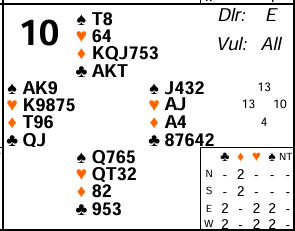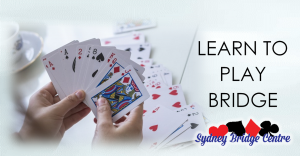City and Canada Bay – Thursday Morning 28th November 2024.

On board 10 last week I suspect several Wests were faced with something that comes up all too frequently – a hand which seems to have no good bid. On such an occasion all you can do is try and pick the least bad option!
Most auctions will surely start P P 1♥ 2♦. West has a normal 1♥ opening and North has a pretty solid 2♦ overcall.
2♦ seems to have ended the auction at quite a few tables which I found quite surprising. Certainly if 2♦ is passed back around to West then he really has no reason to bid again. He knows his partner doesn’t have an opening bid, and his 3 small diamonds are a bad holding – see advanced section for some more discussion. So passing 2♦ out is a perfectly reasonable action for West to take. But what I find surprising is that West should be in that position. Because I think it’s clear for East to take some action over 2♦. He is close to a maximum for his passed hand, he has some tolerance for his partner’s hearts and he has both unbid suits.
It looks as if some Easts bid 2NT which I don’t like – firstly you don’t have quite enough (it should usually be an invitational bid); secondly your diamond stopper is only Ax so it will get knocked out pretty quicky; thirdly you have an easy option to show both your own suits (just because partner opened 1♥ doesn’t mean he can’t have spades or clubs to fit with your hand). So I think it’s clearcut for East to make a takeout double after 1♥ 2♦.
Double does, however, place West in a tough spot! There is no nice rebid because every bid has flaws. When placed in that position all you can do is try and work out the least bad (and console yourself that you won’t be the only one faced with the same decision!) Let’s consider West’s options and the downsides with each of them:
- 2♥ – This is basically repeating a 5 card suit you have already shown in the auction – and the quality isn’t that good either. It could easily play horribly if partner is short.
- 2♠ – This is likely to be a 4-3 fit as partner will usually have 4 for his double. But that could easily mean his 4 card trump holding will be forced to ruff diamonds. Although on the plus side you might be able to ruff a club with your shorter trump holding.
- 2NT – This is probably what you’d have rebid over a 2 level response without any intervention. But it’s not tenable now after the overcall when you hold no diamond stop.
- Pass – This would be a wild gamble, no reason to suppose 2♦ is going off at all!
On balance I would probably resort to rebidding 2♥ primarily because I like all the other options less and at least this keeps us at the 2 level. It’s also the bid most likely to slow partner down as it doesn’t imply a fit for either of his black suits (although it’s unlikely partner will get too carried away as he’s already a passed hand). If West bids fairly quickly and confidently it might encourage North South to bid on themselves anyway – which West would secretly be delighted about!
What about the play? Where North did play 2♦, it typically made exactly 8 tricks – losing 2 tricks in each major and ♦A. As expected, 2NT by East West plays horribly. The diamond lead knocks the ♦A out and North now has a lot of minor suit tricks ready to cash as soon as the defence get back in. The result was -200 or even -300.
2♥ from West is more interesting. North will surely lead ♦K. Although the contract can be made it’s not easy – most of the time declarer will lose 1 spade, 2 hearts, 1 diamond and 2 clubs. If you try to ruff a diamond in dummy, South can overruff ♥J with ♥Q and his remaining ♥10xx will still end up being a trick. If declarer instead tries to draw trumps, he can limit his heart losers to 1 – but to do that he would have to lead ♥A, ♥J from dummy. That means he can’t then ruff a diamond so he will lose 2 tricks there instead. The only way to make the contract is to avoid the spade loser – see advanced section for how to do that.
Key points to note
When faced with an unpalatable set of choices in the auction, try and work out what’s wrong with each option – and pick the least bad.
Remember if you do that fairly quickly and confidently the opponents may have no idea you had a problem and could bid on themselves! Use the time other people take to plan your own bids.
Don’t be afraid to compete in the auction. A takeout double is often a flexible way of keeping the auction alive. But compete most aggressively when no-one is vulnerable and least aggressively when everyone is vulnerable.
Sometimes it can be right to lead an unsupported honour to pick up a suit – but it’s rare.
More advanced
If 2♦ were passed back to him I said West’s 3 small diamonds were a bad holding. Why? Well for a start the obvious reason is they are 3 losers in the opponent’s suit! But it could also mean South is short in diamonds and there’s a good chance anything West played in could start with North leading diamonds and South being able to get a diamond ruff. However, there’s a third more subtle reason too. The fact West has some length in diamonds means it’s more likely that East could be short. But when a hand is short it’s normal to stretch to make a takeout double in case partner has length in the suit and can’t really bid. So if East did have shortage and did NOT take action then that would point to him having a bad hand – hence even more reason for West to stop bidding as quickly as possible. That of course is why, on this particular hand, I think East SHOULD take action – he has nothing to be ashamed about at all.
To make 2♥ (or 2♠) East West on this hand requires declarer to avoid losing a spade. That can be done but by a rather unusual play. He needs to lead the ♠J from East. What can the defence do? If South covers, then declarer wins and now North’s ♠10 will drop on the next round making declarer’s ♠9 a winner. And of course if South doesn’t cover, the ♠J wins. Normally there is no point leading unsupported honours because the defence just cover them and promote their lower cards into winners. The difference here is that declarer has one of the cards that could be promoted (♠9). Playing the ♠J is a variation of something called a surround play. Effectively the power of the ♠10 is neutralised when the ♠J is led from dummy. Is this play realistic to try at the table? Questionable. It’s certainly reasonable to assume North will be shorter in spades after his 2♦ overcall. But it’s perfectly plausible to play him for ♠Qx and just try cashing ♠AK. Which I imagine is what most people did and ended up 1 off.
If West does rebid 2♥ over his partner’s double it’s quite plausible that North might bid 3♦. His suit is good and he has some tricks in clubs as well. Of course if West agonises for ages and looks in great pain before he bids 2♥ that might put North off a bit! Another reason for trying to anticipate your bidding problems and have a decision already made by the time it’s your turn. As soon as East doubles, West should start thinking about his problem no matter how long South takes to act. Bidding quickly and confidently each time makes life so much harder for the opponents – they simply don’t know if you are in a great spot or a terrible one!
One other thing that might put North off competing further is the one I discussed last week – the vulnerability. Game all is, mathematically, the worst vulnerability to compete in the auction. That’s because not only are you risking going off in 100’s if you stretch too far, you may also be giving up the opportunity to be taking THEM off in 100’s if you defend. Any score of 200 at matchpoint pairs on a partscore board will be very good because it beats all the scores that can be made playing regular partscores. Conversely, the best time to compete more aggressively is when no-one is vulnerable.
Julian Foster (many times NSW representative) ♣♦♥♠



